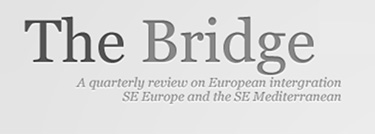The Bridge
2006 - 2011 Archived Content
the bridge, was a quarterly review on the Greek presence in S.E. Europe & the S.E. Mediterranean.
Content is from the site's 2006 -2010 archived pages.
The Bridge 2006
Its main aim is to present and promote to a specialized reading public the highly demanding and of elevated standards yet entirely successful business ventures of Greek origin that are being established in the Balkans area, as well as, in an even widening radius, in SE Europe and SE Mediterranean.
This review will further attempt to timely present both the limits and the prospects of bilateral and over the borders initiatives that transcend the local and are aimed at a much wider level of application, seeking all those actions that could lead in the consolidation of multiple and interrelated communal interests.
Through the medium of Greek activities on all levels ― from business ventures of any kind to educational and cultural networks and from bilateral initiatives between states to projects by NGO's organisations ― The Bridge aspires to become, in a systematic and reliable way, an effective channel of information, disseminated from both sides, on the current and future developments in the wider area of SE Europe and SE Mediterranean.
Q3/2006 - Issue 2
|
|||||||||||||||||||||||||||||||||||||||||||||||||||||||||||||||||||||||||||||||||||||||||||||||||||||||||||||||||||||||||||||||||||||||||
|
|||||||||||||||||||||||||||||||||||||||||||||||||||||||||||||||||||||||||||||||||||||||||||||||||||||||||||||||||||||||||||||||||||||||||

A Publication of the "Agora Ideon"
Contact:
12A Kyprou, Moschato
18346 Athens, Greece
tel: +30.210.482.3977
fax: +30.210.483.2447
About us
The bridge is a publication of the "Agora Ideon" forum (www.agoraideon.eu)
Its main aim is to present and promote to a specialized reading public the highly demanding and of elevated standards yet entirely successful business ventures of Greek origin that are being established in the Balkans area, as well as, in an even widening radius, in SE Europe and SE Mediterranean.
This review will further attempt to timely present both the limits and the prospects of bilateral and over the borders initiatives that transcend the local and are aimed at a much wider level of application, seeking all those actions that could lead in the consolidation of multiple and interrelated communal interests.
Through the medium of Greek activities on all levels ― from business ventures of any kind to educational and cultural networks and from bilateral initiatives between states to projects by NGO's organisations ― The Bridge aspires to become, in a systematic and reliable way, an effective channel of information, disseminated from both sides, on the current and future developments in the wider area of SE Europe and SE Mediterranean.
Issue 17 a2/2010

|
||||||||||||||||||||||||||||
|
|
||||||||||||||||||||||||||||
|
||||||||||||||||||||||||||||

It’s the interests, stupid!
By Kostas A. Lavdas
Crisis management and political rhetoric in Greece
To manage a socio-economic crisis in a politically sound manner, you need to come to terms with three sets of issues. First, you need to know, however vaguely, what brought it about. Second, you need to have a more or less clear view of objectives and priorities. Finally, you will have to try to penetrate the cognitive and sociocultural context of the crisis in question.
Back to basics. Modern economic and social life is dominated by complex and intricate organizations. Perhaps paradoxically, this complicates things when it comes to crises. As Charles Perrow so brilliantly argued, even slight mishaps within these massive and intricate infrastructures can rapidly escalate in unforeseen ways. And as far as ‘crises’ are concerned, the very terminology needs examining. Arjen Boin and Paul ’t Hart have shown that we need to abandon the notion that crises are events that are neatly delineated in time and space. We need, instead, to treat crises as extended periods of high threat, high uncertainty, and high politics that disrupt a wide range of social, political, and organizational processes. In short, crises are dynamic and chaotic processes, not discrete events sequenced neatly on a linear time scale.
On to Greece. What happened in the last couple of years? To begin with, the fundamentals of the Greek economy did not change between 2009 and 2010. What did change, was the way in which the prolonged crisis – because that’s what it was – was dealt with. A textbook application of Naomi Klein’s ‘shock doctrin’ (i.e., using a phase of collective vulnerability as a window of opportunity to usher in change) got out of hand. The point is rather simple. As Robert Putnam explained a few years ago, the politics of international negotiations can usefully be conceived as a two-level game. At the national level, interest groups pursue their goals and politicians seek power by forming coalitions among those groups. At the international level, governments seek to maximize their ability to satisfy their own coalitions, while pursuing objectibves which appear to correspond to perceptions of ‘national interest’. Neither of the two games can be ignored by national politicians, so long as their countries remain both interdependent and ‘sovereign’. Problem is, each of these national politicians appears at both game boards simultaneously. Give too much attention to the national game, and the international gets side-tracked. And vice versa. In short, while the government in Athens, preoccupied with the domestic game board, was busy trying to persuade the public that things looked ugly and big change was needed, governments in places like Stockholm, Paris and Berlin were busy finding ways to safeguard their banks, whose lending to Latvia, Greece and other EU states presaged trouble.
Still, there is a window of opportunity that is now open – even if the actors that actually did the job of opening it are not the ones the governments in Athens or Riga would have us believe. We need to use this window, in order to curb some of the structural constraints on large-scale reform while at the same time reassuring Greek citizens that national democratic accountability is not a thing of the past. The point, then, is to use the current juncture in order to achieve two distinct but closely linked objectives. First, we need to privatize and liberalize, deep and fast. Second, we need to remain steadily fixed in the absolute necessity – for a small state with an open economy and a precarious geopolitical position – of the existence of a capable public sector and powerful regulatory agencies.
Not all the interests – domestic and transnational – that have been involved in opening (and attempting to exploit) the ‘window of opportunity’ will be happy with this combination of strategic objectives. Yet it is the combination that is crucial. Its attainment and sustainability will depend on particular policy coalitions. In what way a new politics could construct a coalition between entrepreneurs, professional strata and qualified public servants, and whether a majoritarian government could be the medium of such a coalition, are questions to which it would be difficult to attempt a confident answer in the present situation. These, however, are the questions that matter.
+++
Kostas A. Lavdas is the Constantine Karamanlis professor of Hellenic and Southeastern European studies at the Fletcher School of Law and Diplomacy, Tufts University, Massachusetts, USA, and a member of the administrative board of the Hellenic Center for European Studies (EKEM).

A step in the right direction: Frontex, Greece & the fight against irregular migration
By Stavros Kourtalis & Gerasimos Tsourapas
''In the European Union's [EU] latest effort to deal a blow to irregular migration across its southern borders, Frontex (established in 2005 as the European Agency for the Management of Operational Cooperation at the External Borders of the Member States of the European Union) will inaugurate its first Operational Office in Piraeus, Greece, on 1 August 2010.
Centrally located in Greece's largest seaport and one of South-East Europe's major transport hubs, the new Piraeus Operational Office will be in charge of coordinating Frontex's actions across Eastern Mediterranean countries (Greece, Italy, Cyprus and Malta), as was decided at a Madrid EU summit in May 2009.
Neither the decision to add to Frontex's institutional capacities nor the particular choice of Piraeus should come as a surprise; since as early as 1999, at the European Council meeting in Tampere, Finland, the EU has striven to develop a proactive migration policy, of which the fight against irregular migration constitutes a central pillar.
Two years ago, based upon the 2004 Hague programme that had aimed for the creation of a common EU immigration and asylum policy, the Council of Ministers adopted the so-called 'Return Directive', standardising procedures regulating the return of illegally staying third-country nationals. More recently, in May 2009, the European Parliament adopted a directive on imposing sanctions for employers who hire irregular migrants.
The choice of Frontex's Operational Office location also makes perfect sense, given that the latest Frontex Annual Risk Analysis argues that, by 2010, 75% of total illegal EU border crossings take place through Greece.
In fact, it has been argued that tackling the 'Eastern Mediterranean' route (crossing Turkey to eastern Greece, southern Bulgaria or Cyprus) constitutes one of the Agency's top priorities, given that migration waves have slowed down in the two other major routes, the Central Mediterranean (Northern Africa to Italy and Malta) and Western African (Western African countries to Spain via the Canary Islands) ones.
To what extent does the inauguration of a new Operational Office in Greece merit optimism in the fight against irregular migration? On the one hand, the numbers seem to agree that the new Office will most likely augment Frontex's already successful role: according to its Deputy Executive Director Gil Arias-Fernandez, a 33% reduction in total illegal entry detentions (from 166,000 to 106,000) has already been registered.
A drop also took place in terms of sea border arrests between Greece and Turkey, from 56,000 (in 2008) to 49,000 (in 2009). Land border arrests between the two countries were also decreased, from 14,000 to 10,000 under the same time period.
Across the Mediterranean basin, a number of bilateral agreements (such as the one signed between Italy and Libya, Spain and Senegal, and so on) have also helped stem the tide of arrivals: in West Africa, only five detentions took place in the first three months of 2010, as opposed to a staggering 31,700 detentions during 2006.
The above numbers, however, hide the much more sober picture of immigration waves in South-Eastern Europe: the absence of a working agreement on immigration prevention and control between Greece and Turkey (only recently have political steps been taken towards the activation of the 2001 bilateral Re-Admission Protocol) has helped encourage Eastern Mediterranean immigration as other routes have been more effectively patrolled.
European NGOs continue to lament the lack of reliable quantitative data on irregular immigration, which, in turn, help promote unfounded stories on 'floods of illegal immigrants', on the loss of jobs to immigrants, or on exorbitantly heavy strains on public services. At the same time, Frontex has been frequently confronted with accusations of human rights violations, especially in its treatment of asylum seekers who attempt to enter the EU.
The creation of a new Operational Office in Piraeus and the strengthening of Frontex in general needs, thus, to be accompanied by a number of other political efforts, both on the national and the European level that would enable the Agency to acquire the enhanced role it seeks.
Firstly, the European Commission should work closely with national policymakers towards the creation of standardised databases on migration across the continent, in the hope of generating more reliable estimates. A more accurate numerical portrayal of irregular migration in Europe would also aid in the visibility of Frontex's efforts and, in the long term, in increased social awareness across the EU member states.
Lastly, the positive effects that bilateral readmission agreements between EU member states and neighbouring countries have had on curbing migration waves suggest that such agreements should continue being forged between countries of origin (such as Pakistan, Afghanistan, Somalia, etc.) and EU countries of transit.
All things considered, the new Operational Office should, indeed, be considered a significant step in enhancing Frontex's role in South-Eastern Europe and dealing a significant blow to irregular migration in the Mediterranean. At the same time, however, it should serve to remind us of the political and administrative gaps that remain to be bridged, before we can truly talk of an efficient, proactive, pan-European immigration strategy.'

Reactions to the ICJ ruling on Kosovo: The domestic & regional dimension
by Bledar Feta & Apostolis Karabairis,EKEM/CSIS
The curtain rose on the latest act of Balkan diplomacy: the advisory opinion of the International Court of Justice (ICJ) on the legality of Kosovo’s proclamation of independence in 2008 was announced at 15:00 CET on Thursday, July 22. Contrary to what had many expected, the Court did not come up with a Solomon’s judgment that might prove equally (un)satisfactory for both sides; rather, it produced a clear winner and a loser.
In its ruling the ICJ stated that the February 2008 declaration of independence by the Kosovo Assembly violated neither the international legal order nor the United Nation Security Council Resolution 1244. In September 2008 the Court was asked by the United Nations General Assembly to give its advice on a question put forth by Serbia, which inquired “whether the declaration of independence by the provisional self-ruling institutions of Kosovo was in line with international law.” Resorting to the ICJ was a shrewd diplomatic stroke by Belgrade, through which it bought time and slowed international momentum toward recognition of Kosovo for over two years. Pristina and Belgrade are engaged in a battle on the world stage to draw countries into their respective camps. Ultimately, Serbia’s attempt to outmaneuver Kosovo through the ICJ laid in ruins, leading to one of the most important victories of Kosovar Albanians in the international arena.
The President of ICJ Hisashi Owada read the decision according to which Kosovo’s declaration of independence does not violate international law in principle, since the latter contains no prohibition of such kind. In this light, he pointed to around 100 similar declarations throughout world history, whose legality has not been questioned. Further, the Court’s decision read that the UN Charter principle of territorial integrity applies to inter-state relations, not secessions. With regard to UN Security Council Resolution 1244, the Court argued that it did not preclude any sort of final status outcome, including independence. The judgment did not mention whether Kosovo’s secession was legal, or whether other states could legally recognize its independence. Rather, all it did was to rule that international law does not prohibit the declaration of independence.
The ICJ opinion can be summarized in three main points:
- Kosovo’s Declaration of independence does not violate international law
- Kosovo’s declaration of independence does not violate UN Security Council Resolution 1244
- Independence does not violate the Constitutional Framework for Provisional Self-Government
Although not binding, the ICJ’s advisory opinion bears significant political weight and forms a turning point in the long-debated Kosovo issue, as it can be seen from the reactions that it provoked both throughout the region, as well as globally. Reactions of the two parties concerned are indicative of their attitudes and their future intentions. Additionally, since each side is not made up of one single subject, it is crucial to examine all basic actors that exercise a larger or smaller influence within each side.
Reactions from Serbia
The advisory opinion of the ICJ came as a slap in the face to the Serbian side. Optimist statements of their leaders in the previous days notwithstanding, Serbs were very disappointed to see that their own initiative backfired, although it had initially been experienced as a victory, when pro-Albanian countries at the UN General Assembly in September 2008 failed to block the Serbian proposal from proceeding to the ICJ.
Serbian president Boris Tadić described the decision as harsh, but nevertheless tried to downplay its impact by pointing out to the rather vague distinction that ICJ itself had made between the unilateral declaration of independence and the right to secede, claiming that the Court concentrated on the technical nature of the former, while it avoided to take positions on the latter, which is of most substance. This distinction, as well as the Court’s omission to rule on the legal implication of the independence declaration (as, for example, on whether it produces statehood), has appeared in the statements of other Serb officials, too, and generated a debate about whether the question to the ICJ was properly formulated by the legal expert team. The government, on its part, reaffirmed its resolution never to recognize an independent Kosovar state and reiterated its commitment to continue fighting by political means. Furthermore, it announced an extraordinary session to examine its next steps, above all seeking the adoption of a favorable resolution at the UN General Assembly.
Government parties came up with calls for unity and renewed efforts but were also supportive of the government and the President, despite the debacle. On the contrary, opposition parties were highly critical: DSS president Koštunica called for resignations, while Nikolić’s SNS and Šešelj’s SRS demanded a harder line in the Kosovo issue, since the current policy of concessions and partnership with the West proved, as they claimed, to be detrimental to Serbian national interests. On the other side, Jovanović and Drašković, leaders of LDP and SPO respectively who had previously endorsed the idea of Serbia’s recognizing Kosovo as a sovereign state, each applying their own rationale, found new grounds to support their stance and invited more political parties in the country to join them.
All the same, such revisionist approaches remained marginal in the political spectrum, while gaining only little support among the circles of domestic liberal thinkers. The prevailing mainstream opinion reads that the official state policy vis-à-vis Kosovo should remain generally the same. This is, after all, what the Kosovo Serb local leadership had asked for immediately after the announcement of the ICJ opinion. The head of the Kosovska Mitrovica periphery Radenko Nedeljković called Belgrade not to give up fighting against the recognition of the Kosovar state and his fellow Serbs in Kosovo to continue their boycott of Kosovar institutions and retain their own parallel ones.
Non-party actors’ reactions were less visible in Serbia. No massive demonstrations were observed either in Serbia proper or in Kosovo. Even in Kosovska Mitrovica the crowd remained quiet, unlike previous times. High security measures taken by KFOR were thus rendered needless. Obviously the prevailing feeling was disappointment rather than indignation, hence no one burst out in dynamic actions.
The reaction of the usually talkative Serb Patriarch Irinej was in the same wavelength. He called the flock to join a special service and pray for Kosovo. Carefully chosen words made up a statement, which, although partial, did not convey intolerance or xenophobia.
In conclusion, initial Serb reactions to ICJ’s decision show that no major shift is expected to take place on Serbian policy as far as the Kosovo issue is concerned. And this is due to the salience attributed to it by the right-wing parties and because advocating a revised approach has become a taboo for almost every Serb politician. Therefore, albeit with a weakened arsenal, Serbia seems intent to remain on the same track. What is most likely to change is the people that occupy some key positions. There has been increasing pressure that Serb Minister of Foreign Affairs Vuk Jeremić is removed from office, because he has been the champion of, and directly responsible for the ICJ venture, but also because he most objects to any policy update. In a broader aspect, the whole government, along with the President of the Republic, has been held responsible for the heavy defeat. Fortunately for them, the governmental coalition has remained united, which is not given in such cases, but still their image has been suffered and opposition has got a chance to morally discredit them in front of the electorate on this all-important issue.
As a consequence, many are those who fear that Serbia again risks turning isolationist and putting its European integration perspective at stake, not only because this perceived national debacle is attributed to the pro-Western block, but also because Serbian citizens largely got disillusioned by the international community, and especially Western nations, most of which stood against their country with no serious reservation.
Reactions from Kosovo
The advisory opinion of the ICJ drew immediate reactions from Kosovo and Albanian-inhabited countries. Scattered across Kosovo, Serbia, FYR of Macedonia and Montenegro, Albanians followed intently what was happening miles away in The Hague. The decision has been interpreted as a historical victory for the Albanian nation, and also an argument that will add many more recognizing states to the current list of 69. Kosovars celebrated the verdict on the streets of Pristina by hugging each other, blowing the horns of their cars and waving Kosovo’s flag, considering the decision a resounding reaffirmation of the legitimacy of their cause.
Kosovo officials described the long-awaited opinion as a great victory in their country’s struggle to be recognized as a full and legitimate state, as the Court stated clearly and explicitly in favor of Kosovo, an unexpected outcome for the majority of the Albanian population. Kosovo Prime Minister Hashim Thaci reaffirmed his government’s willingness for talks with Serbia over technical issues. According to him the “decision on the declaration of independence has been reconfirmed, legalized, and re-legitimized by the ICJ’s opinion, offering an opportunity to all countries that hesitated to recognize Kosovo, to do so, as all the dilemmas have been resolved”. The Minister of Foreign Affairs Skender Hyseni made clear that any discussion with Serbia on practical matters of mutual interest must be on an equal footing and on a state-to-state basis. Kosovo leaders desire engaging in negotiations that aim to leave Kosovo an independent state with its Serb-populated northern region part of it. Diplomatic sources claim that discussion between the two countries on decentralization, cultural heritage and the northern part of Kosovo can start later this year. July 22 was another blessed day for the Republic of Kosovo and all her people, stated the country’s President Fatmir Sejdiu. The Kosovo President called for more international recognitions, as the ruling eventually removes all the doubts that countries that have not recognized Kosovo yet may have had.
There is now more optimism in Pristina that the nonbinding verdict, which comes two years after the UN General Assembly requested the opinion, will set the stage for a renewed Kosovo push for more international recognitions. The government in Pristina desires to expand the current total of 69 recognitions to more than 100, thus demonstrating the country’s legitimacy through the majority of United Nation members. This could provide a new impetus to Kosovo’s regional cooperation and integration into international organizations. It should, however, be noted that the increased number of recognitions does not necessarily open the way for Kosovo’s UN membership given the opposition by China and Russia, two veto-wielding members in the United Nation Security Council. Kosovo is expected to apply for United Nations’ membership in 2011.
Kosovo Assembly has adopted a declaration in support of the advisory opinion, stating that the historical decision will contribute to peace and stability not only of the Republic of Kosovo, but the whole region. Considering the Court’s decision to be professional and impartial, respecting at the same time Kosovo citizen’s willingness for independence the declaration call the European Union to find a modus vivendi on Kosovo issue while demands from the reluctant countries to recognize the new state. In clear contrast to Serbian views, Kosovo officials believe that Kosovo does not constitute a precedent in any other case in the world. The Court’s opinion was closely tailored to the unique circumstances of Kosovo; it was not about other regions or states. Furthermore, as far as the statements of Kosovo officials are concerned, it has been clear that nothing in the opinion given by the Court casts any doubt on the statehood of the Republic of Kosovo, which is an established fact.
The reaction from the political parties was in the same wavelength. The IJC opinion was considered from both government and opposition parties as the best answer that has been given thus far on the Kosovo’s right as a legitimate, legal, consolidated and functional state. Generally, there was a consensus between them that the decision is righteous international historical response to historical injustice that has been made to Kosovo. In contrast to Kosovo’s officials, the Vetevendosje (self-determination) movement, a popular nationalist civil society group, does not share the same views. They accuse Kosovo government and politicians of attributing more importance to the formal attributes of Kosovo independence and less to its territorial integrity and genuine sovereignty. Vetevendosje thinks that the government’s celebratory tones are not justified by the ICJ decision since the latter did not rule on the substance of Kosovo’s independence but rather on the fact that the declaration is not illegal. More have to be done for consolidating Kosovo independence. The movement’s leader Albin Kurti protests against the implementation of the Ahtisaari plan as it does not provide sovereignty to Kosovo but a ‘deepening partition’ giving Belgrade actually the opportunity through decentralization to control every Serbian populated territory.
Reactions from Banja Luka, Tirana, Tetovo and the Presevo Valley
Every development in the Kosovo issue unavoidably has an impact on Bosnian Serbs, since it is often linked to the future of Republika Srpska. With regards to ICJ’s advisory opinion, Bosnian Serb leaders once more aligned themselves with official Belgrade. They accused the court of bias and politically driven decision-making and reassured that Bosnia and Herzegovina will continue its policy of non-recognition with regard to Kosovo. To the question of whether the ICJ ruling will affect Republika Srpska’s status vis-à-vis the Bosnian state similar, Prime Minister Dodik made it clear that Republika Srpska remains an entity within Bosnia and Herzegovina according to the Dayton Agreement. However, Dodik did not dismiss the possibility of its self-determination in the long run. Apart from his intentions in the domestic scene, this statement indicated support to the Serbian cause but also served as a warning that insistence on Kosovo’s independence may have far-reaching spillover effects.
Swift was the reaction from Albania, which is seen as the “mother country”. Immediately after the decision the Albanian Prime Minister, Sali Berisha, welcomed the “historical” opinion. Berisha believes that the Hague verdict makes a major contribution toward fresh relations between the Serbs and the Albanians between, Tirana and Belgrade as well as to help in the relations between Pristina and Belgrade. There is no doubt that after the unilateral declaration of Kosovo’s independence Albania has increased its efforts to cooperate with region countries, especially with the Albanian inhabited ones. Furthermore, Albanians and Kosovars are against every attempt of bargaining with territories. According to him, The Hague definitely puts an end to this chapter and through Kosovo’s independence the fluidity of the Albanians in the Balkans comes to an end; it turns into a settled issue and, thus, gets consolidated. The Albanian Minister of Foreign Affairs described the decision as a reconfirmation of the unchangeable right of the citizens of Kosovo for self-determination, contributing to stability in Kosovo, the region and further. Albania expresses its full support for the further affirmation of Kosovo across the international arena. Opposition leader, Edi Rama expressed great satisfaction with the decision, stressing that Albanians are not divided when it comes to Kosovo issue. All political parties and institutions in Albania also welcomed the Court’s decision.
For more than two decades, Kosovo and the Kosovo issue have been in the center of attention of the political and scientific circles of the Albanian inhabited countries in the area. The Albanian political parties in the Former Yugoslav Republic of Macedonia have an unchanged position towards the Kosovo issue, which is: “Kosovo a sovereign and independent state and an important precondition for the stability of the region”. They do not see nor treat the resolution of the issue as a national problem of Albanians, but as something that surpasses the national boundaries and affects regional stability and progress. Thus, the Democratic Union for Integration, the largest Albanian political party in the country, considers the Court’s decision as a clear confirmation of the legality of the creation of the new state; in addition, it views its decision as endorsing the correctness of the FYROM government’s earlier decision to recognize Kosovo and to establish diplomatic relations. For the leader of the opposition Democratic Party of Albanians, Menduh Thaci, the ICJ’s opinion constitutes a fundamental act of the new historical era that begins in the region. For Thaci the decision is proof of the honorable Albanian struggles for freedom and independence, while at the same time constituting an extraordinary contribution to peace and stability in the region. Generally, Albanians in FYROM view the decision as serving the common good of the region and downplay the Albanian nationalist element in it.
The political elite of Presevo Valley, which is home to the largest Albanian community in Serbia, notice the great importance of the decision not only for Kosovo but also for its eastern side: Presevo, Bujanovac and Medvedja, “three municipalities that never given up the struggle for freedom and independence.” Radical and moderate political parties in the Valley published press releases on ICJ’s decision, congratulating the Kosovo authorities and the Albanian nation. Additionally, the Albanian diasporas around the world celebrated their personal contributions to this historical achievement. In all Albanian-inhabited territories, community leaders, activists, politicians, and intellectuals viewed the decision as a historical victory that belongs to the whole Albanian nation. Although Albanian political elites in the Balkans have a long history of mutual animosity as far as their own distinct problems and agendas is concerned, it should not be difficult to find common ground when it comes to the Kosovo issue.
balkan express -NEWS-
EU-Western Balkans High Level Meeting in Serajevo
The EU-Western Balkans High Level Meeting, organized on the 2nd of June, in Sarajevo by the Spanish Presidency, marks the 10th anniversary of the Zagreb Summit of 25 November 2000, where EU launched the Stabilization and Association Process and the European perspective for Western Balkans.
The EU and the west Balkan countries, but also participants from US, Russia, Turkey, OSCE, Council of Europe and NATO, welcomed the progress of the last decade that brought the Balkans from war-torn times on the road to prosperity.
The High Representative of the EU for Foreign Affairs and Security Policy and Vice-President of the Commission, Catherine Ashton, and the Commissioner for Enlargement and European Neighbourhood Policy, Štefan Füle, welcomed the outcomes of the meeting, stressing that the EU will support and reaffirmthe Balkans’ place in Europe and the European perspective for the region.
The Director of OSCE's Conflict Prevention Centre, Ambassador Herbert Salber, stressed that “Making more use of the tools that the OSCE provides would benefit the countries of the Western Balkans”, inviting in this way the participant countries to make use of the OSCE tools to achieve more stability on the basis of cooperative security.
The Annual Regional Meeting of OSCE
On the 21st of June, was held the annual regional meeting, hosted by Vienna-based OSCE Secretariat's Conflict Prevention Centre. In cooperation with the OSCE Mission to Bosnia and Herzegovina, the meeting brought together Heads of OSCE Field Operations from South-Eastern Europe, the Director of the Conflict Prevention Centre, Ambassador Herbert Salber.
The participants discussed present and future work of OSCE Missions in the region and the importance of cooperation and partnership between the OSCE and EU in South-Eastern Europe.
“Both organizations value democracy and fundamental freedoms, values that are shared by each of the countries we work in,” said Ambassador Gary D. Robbins, Head of the OSCE Mission to BiH. “The OSCE, with its inclusive membership and its comprehensive security concept, is the natural place for dialogue and cooperation of all.”
All participants agreed that cooperation between the two organizations is crucial for stability in South-Eastern Europe.
Montenegro: the role of women in the security sector
The Third OSCE Regional Meeting of Women Parliamentarians was held in Cetinje of Montenegro, on the 22nd of June, in order to strengthen the role and participation of women in the security sector.
Ambassador Paraschiva Badescu, the Head of the OSCE Mission to Montenegro, argued that "Although enormous strides have been made over the last decades, the continued under-representation of women in governance structures requires specific effective measures to promote gender balance in all legislative, judicial and executive bodies, especially at the political and decision-making levels". Meeting participants agreed that enhancing gender equality was an important tool for conflict prevention and the creation of sustainable peace. They also noted that women played an important stabilizing role in South-Eastern Europe during the conflict and post-conflict period of the last decade.
The meeting was held as part of the 10th Cetinje Parliamentary Forum, organized by the Parliament of Montenegro, the OSCE Mission to Montenegro and the United Nations Development Programme in Montenegro on the occasion of the 10th Anniversary of the adoption of UN Security Council Resolution 1325 on women and peace and security.
OSCE Presence supports parliamentary oversight of security services
The OSCE Presence in Albania announced on the 14th of July, in Tirana, that it is providing assistance with the drafting of a bill on parliamentary oversight of the intelligence and security services.
A former expert member of the Intelligence and Security Committee of the U.K. parliament, together with OSCE staff were authorized to provide recommendations that would be submitted to the Chair and the Committee members of all political parties, members of institutions and civil society, before the bill is drafted. The objective is to help produce a first draft to strengthen parliamentary procedure, regulating the oversight of the parliament over the work of the Intelligence and Security Services.
The support followed a request from the Chairman of the National Security Committee of the National Assembly of Albania and is part of the Presence's Parliamentary Support Project, funded by the Embassy of the Kingdom of the Netherlands.
Anniversary of the signing of the Ohrid Framework Agreement
On the 12th of August a joint statement was issued in Skopje, by EU, NATO, OSCE and UN, in order to mark the 9th anniversary of the signing of the Ohrid Framework Agreement.
According to the statement, the EU Special Representative and Head of Delegation of the EU, Erwan Fouéré, the NATO HQ Skopje Commander and Senior Military Representative David Humar, the Head of the OSCE Spillover Monitor Mission to Skopje Ambassador Jose-Luis Herrero and the United States Ambassador Philip T. Reeker, on behalf of the four organizations, recognized and welcomed the positive progress the country has made in improving interethnic relations since the signature of the Ohrid Framework Agreement. They also recognized, that the Agreement and relevant constitutional provisions remain indispensible to building a peaceful, and cohesive multiethnic society, verifying in this way their commitment to the Ohrid Framework Agreement.
They also stressed the particular importance of adopting further measures in the fields of equitable representation, decentralization and education, noting, that further efforts are needed in order to establish an education system able to foster integration and interethnic relations at all levels.

Publishing and Business
Development Director: Kostas Tsaousis
Project Director: Victor Dhimas
Editors in Chief: Dimitris Xenakis
Copy Editing: ICET
Scientific Coordinators:
Kostas Lavdas
Michael Tsinisizelis
Panayiotis Tsakonas
Kostas Yfantis
Dimitris Chryssochoou
Christos Paraskevopoulos
Dimitris Bourantonis
Artwork Team:
Rubini Natsi
Dimitris Stergiou
Advertising Executive Manager: Emmanouela Cheirakaki
Montage-Printing: Bibliosynergatiki S.A.
Editorial Consultants:
Eleni Fotiou
Thanos Triantafillou
Editorial Team:
Constantinos Angelopoulos
Ali Osman Egilmez
Maria Katechi
Kostis Kapopoulos
Alexandra Sarmas
Simos Ververidis

























